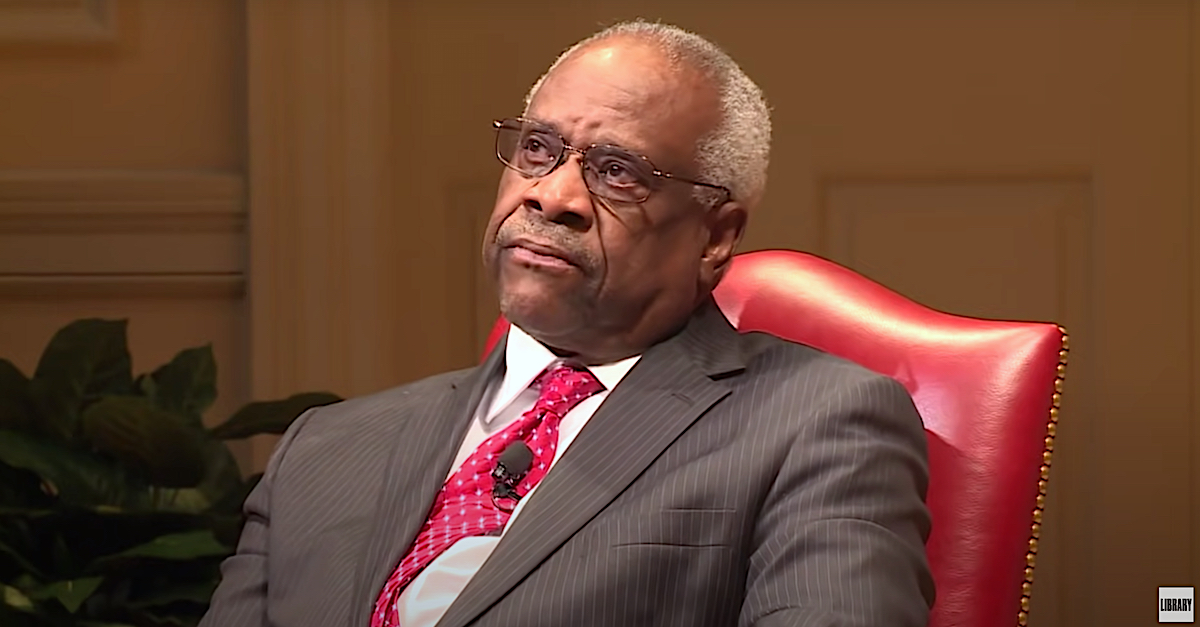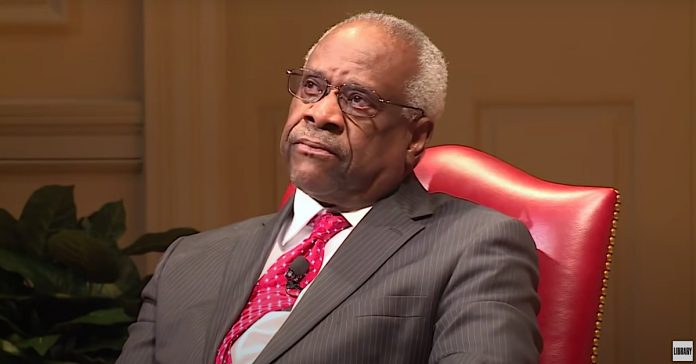
Clarence Thomas during a 2018 legal discussion (YouTube/Library of Congress).
U.S. Supreme Court Justice Clarence Thomas on Monday castigated his colleagues for denying review in a case brought by the widow of a military member who was blocked from suing the federal government after her husband was killed in a collision with a civilian government employee who later said the crash was “100 percent” her fault.
In an eight-page dissent published Monday, Thomas called for the justices to overturn a 75-year-old case in which the court immunized the U.S. from liability in civil cases under a large swath of circumstances not directly addressed by the Federal Tort Claims Act (FTCA). The FTCA allows individuals to sue the government for damages caused by the negligent or wrongful acts of federal employees who are acting within the scope of their official duties.
The FTCA also has a military exception that precludes lawsuits arising out of “combatant activities” during “time of war.” However, a judicially created doctrine, known as the Feres Doctrine, created a broader exception to the FTCA for “injuries incident to military service,” which Thomas has long railed against.
The case stems from the death of Air Force Staff Sergeant Cameron Beck, who was off-duty when he died in a car crash at Whiteman Air Force Base in Missouri on April 15, 2021. Beck was riding his motorcycle home to have lunch with his family when a civilian employed by the federal government and driving a government-issued van became “distracted on her phone” and turned the vehicle into Beck”s path. Beck died at the scene and the driver later pleaded guilty to criminal negligence, stating that “the accident was ‘100 percent’ her fault,” court records show.
Love true crime? Sign up for our newsletter, The Law&Crime Docket, to get the latest real-life crime stories delivered right to your inbox.
Beck’s wife then sued the driver’s employer, i.e., the federal government, over Beck’s wrongful death. According to Thomas, it “ordinarily would have been an open-and-shut wrongful death case,” but reliance on the Feres Doctrine led the 8th U.S. Circuit Court of Appeals to affirm a lower court’s dismissal of the case, leaving Beck’s widow and their son without recourse.
“Today, the Court denies her petition, so Mrs. Beck will recover nothing in tort for her husband’s wrongful death,” Thomas wrote.
The Feres Doctrine holds that the FTCA’s waiver of federal immunity does not apply in cases “where the injuries arise out of or are in the course of activity incident to military service.”
Thomas asserts that even under existing precedent, which has been “almost universally condemned by judges and scholars,” the court should have taken Beck’s case, as his death “did not arise out of …activities incident to his military service.”
“The Court of Appeals acknowledged that Staff Sergeant Beck was ‘killed during off-duty hours’ and that his death ‘arose out of nonmilitary activities,'” Thomas wrote. “Feres itself distinguished cases in which the injured serviceman was ‘under compulsion of no orders or duty’ and was ‘on no military mission.’ Beck was not ordered on a military mission to go home for lunch with his family. So Mrs. Beck should have prevailed under Feres.”
Thomas also emphasized that the doctrine has been problematic among the lower courts, calling application of the Feres Doctrine “irreconcilable.”
“They have told us that the Feres doctrine is now ‘an extremely confused and confusing area of law,'” Thomas wrote, referring to the lower courts. “As I have explained, it is unsurprising that, with its atextual roots and vague rationales, ‘[t]he Feres doctrine cannot be reduced to a few bright-line rules’ and has thus left courts in disarray.”
Justice Neil Gorsuch did not join Thomas’ dissent, but said he too would have granted review of the case.
Justice Sonia Sotomayor agreed in principle that Feres’s “atextual expansion” of the FTCA had garnered “near-universal criticism” and caused “significant confusion.” However, she voted to deny review “out of respect” for the court’s precedent, reasoning that it was on the legislature to make the necessary changes.

